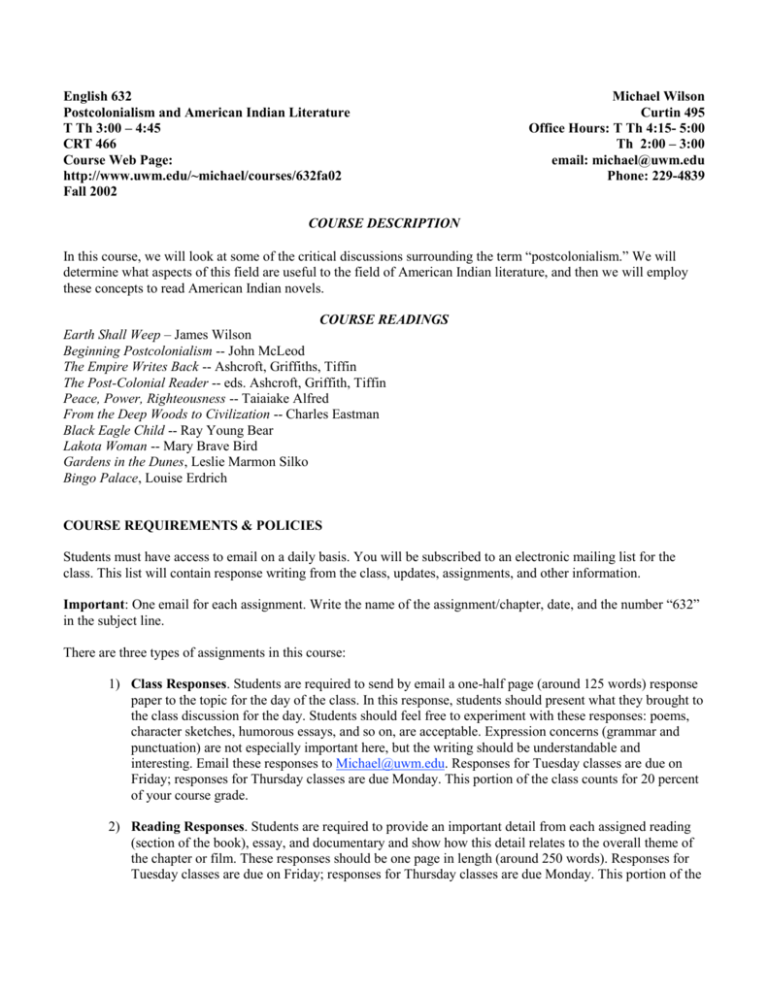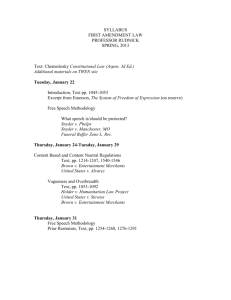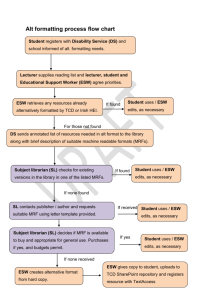Syllabus - pantherFILE
advertisement

English 632 Postcolonialism and American Indian Literature T Th 3:00 – 4:45 CRT 466 Course Web Page: http://www.uwm.edu/~michael/courses/632fa02 Fall 2002 Michael Wilson Curtin 495 Office Hours: T Th 4:15- 5:00 Th 2:00 – 3:00 email: michael@uwm.edu Phone: 229-4839 COURSE DESCRIPTION In this course, we will look at some of the critical discussions surrounding the term “postcolonialism.” We will determine what aspects of this field are useful to the field of American Indian literature, and then we will employ these concepts to read American Indian novels. COURSE READINGS Earth Shall Weep – James Wilson Beginning Postcolonialism -- John McLeod The Empire Writes Back -- Ashcroft, Griffiths, Tiffin The Post-Colonial Reader -- eds. Ashcroft, Griffith, Tiffin Peace, Power, Righteousness -- Taiaiake Alfred From the Deep Woods to Civilization -- Charles Eastman Black Eagle Child -- Ray Young Bear Lakota Woman -- Mary Brave Bird Gardens in the Dunes, Leslie Marmon Silko Bingo Palace, Louise Erdrich COURSE REQUIREMENTS & POLICIES Students must have access to email on a daily basis. You will be subscribed to an electronic mailing list for the class. This list will contain response writing from the class, updates, assignments, and other information. Important: One email for each assignment. Write the name of the assignment/chapter, date, and the number “632” in the subject line. There are three types of assignments in this course: 1) Class Responses. Students are required to send by email a one-half page (around 125 words) response paper to the topic for the day of the class. In this response, students should present what they brought to the class discussion for the day. Students should feel free to experiment with these responses: poems, character sketches, humorous essays, and so on, are acceptable. Expression concerns (grammar and punctuation) are not especially important here, but the writing should be understandable and interesting. Email these responses to Michael@uwm.edu. Responses for Tuesday classes are due on Friday; responses for Thursday classes are due Monday. This portion of the class counts for 20 percent of your course grade. 2) Reading Responses. Students are required to provide an important detail from each assigned reading (section of the book), essay, and documentary and show how this detail relates to the overall theme of the chapter or film. These responses should be one page in length (around 250 words). Responses for Tuesday classes are due on Friday; responses for Thursday classes are due Monday. This portion of the class counts for 50 percent of your course grade. You are to write after we have had a chance to discuss sections in class. Email these responses to Michael@uwm.edu. 3) Short Papers. Students are also required to write two more formal five-page papers, the first due November 5th, and the second due December 19th. The most important aspects of these papers are insightful commentary about the readings and a strong focus (organization). Email these responses to Michael@uwm.edu. The short papers count for 30 percent of your course grade (15% each). INCOMPLETE POLICY Students will receive “incompletes” in the cases of documented health emergencies or other catastrophic emergencies. Late papers will be accepted only with prior approval from the instructor. Papers turned in late without prior approval will be returned without an assigned grade. ACADEMIC HONESTY Academic honesty is fundamental to the activities and principles of a university. All members of the academic community must be confident that each person’s work has been responsibly and honorably acquired, developed, and presented. Any effort to gain an advantage not given to all students is dishonest whether or not the effort is successful. The academic community regards academic dishonesty as an extremely serious matter, with serious consequences that range from probation to expulsion. When in doubt about plagiarism, paraphrasing, quoting, or collaboration, consult with your instructor. Students who engage in plagiarism will receive a failing grade for the course. Fall 2002 NOTE: Approximate Schedule Week 1: Tuesday – September 3 Introduction – Groupwork Thursday – September 5 Ashcroft, Introduction McLeod, Introduction ESW Prologue, Chapter 1 Week 2: Tuesday – September 10 Ashcroft I, “Cutting the Ground” McLeod 1 Commonwealth to Postcolonial Spivak, “Can the Subaltern Speak?” (Reader) Thursday – September 12 Parry, “Problems in Current Theories…” (Reader) Slemon, “The Scramble for Post-colonialism” (Reader) ESW Chapter 2 Week 3: Tuesday – September 17 Ashcroft 2, “Re-Placing Language” McLeod 2, “Reading Colonial Discourses” Achebe, “Colonialist Criticism” (Reader Thursday – September 19 Larson, “Heroic Ethnocentrism” (Reader) Bishop, “Western Mathematics” (Reader) ESW Chapter 3 Week 4: Tuesday – September 24 Ashcroft 4, “Theory at the Crossroads” McLeod 3, “Nationalist representations” Said, “Orientialism” (Reader) Thursday – September 26 Kincaid, “A Small Place” (Reader) Tiffin, “Post-colonial Literatures” (Reader) ESW Chapter 4 Week 5: Tuesday – October 1 Ashcroft 5, “Re-placing theory” McLeod 4, “The Nation in Question” [Sharpe, “Figures of Colonial Resistance” (Reader)Taken off the reading list. Thursday – October 3 Fanon, “National Culture” (Reader) Bhahba, “Dissemination” (Reader) ESW Chapter 5 ESW Chapter 10 Week 6: Deep Woods Tuesday – October 8 McLeod 7, Diaspora Identities [Soller, “Who is Ethnic” (Reader) Taken Week 11: Bingo Palace Tuesday – November 12 Lee, “Writing in a Colonial Space” Alfred, “Native Political Elites” off the reading list.] Thursday – October 10 Mudrooroo, “White Forms, Aboriginal Content” ESW Chapter 6 Week 7: Deep Woods Tuesday – October 15 Goldie, “Representation of the Indigene” (Reader) Griffiths, “Myth of Authenticity” (Reader) Thursday – October 17 Trinh T. Minh-ha, “No Master Territories” ESW Chapter 7 Thursday – November 14 Alfred, “Abuse of Power” and “Re-empowerment” ESW Chapter 11 Week 12: Black Eagle Child Tuesday – November 19 Altbach, “Education and Neocolonialism” Alfred, “’Sovereignty’ – An Inappropriate Concept” Thursday – November 21 Alfred, “Colonial Mentalities” and “Co-optation” ESW Chapter 12 Week 8: Lakota Woman Tuesday – October 22 McLeod 6, Postcolonialism and Feminism Trinh T Minh-ha, “Writing Postcoloniality and Feminism Week 13: Black Eagle Child Tuesday – November 26 Wilson and Moore, "Interview" (on-line) Salzer, "Ray Young Bear's Cantaloupe Terrorist: Storytelling as a Site of Resistance" (on-line) Alfred, “Self-Conscious Traditionalism” Thursday – October 24 Katrak, “Decolonizing Literature: Toward a Theory for Post-Colonial Women’s Texts” ESW Chapter 8 Thursday – November 28 No Class Week 9: Lakota Woman Tuesday – October 29 Suleri, “Woman Skin Deep: Feminism and the Postcolonial Condition” (Reader) Mohanty, “Under Western Eyes: Feminist Scholarship and Colonial Discourses” (Reader) Thursday – October 31 Fee, “Who Can Write As Other?” (Reader) ESW Chapter 9 Week 10: Bingo Palace Tuesday – November 5 Alfred, “Native American Political Traditions” Mitchell, “Postcolonial Culture, Postimperial Criticism” (Reader) Thursday – November 7 Week 14: Gardens in the Dunes Tuesday – December 3 Chakrabarty, “Postcoloniality and the Artifice of History” (Reader) Alfred, “Leadership” and “Responsibility” Thursday – December 5 Alfred, “Money” ESW -- Epilogue Week 15: Gardens in the Dunes Tuesday – December 10 Christian, “Race for Theory” Alfred, “Modern Treaties: A Path to Assimiliation” Thursday – December 12 Alfred, “For the Youth: Toward a New Native Leadership”






